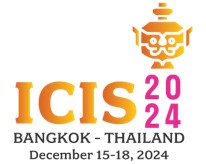Loading...
Paper Number
1710
Paper Type
Short
Abstract
Prosocial lending is a specific form of crowdfunding where lenders’ decisions involve considerations related to both charitable donations and financial investment. While prior literature has explored how these considerations are reflected in lenders' assessments of borrowers' narrative orientations and their characteristics, the impact of the interplay between these different assessment bases on crowdfunding outcomes remains unclear. To address this gap, our study has developed a model by integrating expectancy violation theory and stereotype content theory. It suggests that emotional variability could enhance the positive impact of socially oriented narratives on crowdfunding speed, while it could amplify the negative impact of financially oriented narratives on crowdfunding speed. A preliminary survival analysis of 173,646 loan requests from Kiva, a leading prosocial lending platform, corroborates these hypotheses. Our findings are expected to contribute to both academic understanding and practical approaches to optimizing prosocial crowdfunding performance.
Recommended Citation
Zhang, Yicheng; Fu, Chenxi; Zhou, Ya; and Liu, Yi, "For Your Predicament or Your Success? Understanding Lenders' Decisions in Lending-based Prosocial Crowdfunding" (2024). ICIS 2024 Proceedings. 28.
https://aisel.aisnet.org/icis2024/diginnoventren/diginnoventren/28
For Your Predicament or Your Success? Understanding Lenders' Decisions in Lending-based Prosocial Crowdfunding
Prosocial lending is a specific form of crowdfunding where lenders’ decisions involve considerations related to both charitable donations and financial investment. While prior literature has explored how these considerations are reflected in lenders' assessments of borrowers' narrative orientations and their characteristics, the impact of the interplay between these different assessment bases on crowdfunding outcomes remains unclear. To address this gap, our study has developed a model by integrating expectancy violation theory and stereotype content theory. It suggests that emotional variability could enhance the positive impact of socially oriented narratives on crowdfunding speed, while it could amplify the negative impact of financially oriented narratives on crowdfunding speed. A preliminary survival analysis of 173,646 loan requests from Kiva, a leading prosocial lending platform, corroborates these hypotheses. Our findings are expected to contribute to both academic understanding and practical approaches to optimizing prosocial crowdfunding performance.
When commenting on articles, please be friendly, welcoming, respectful and abide by the AIS eLibrary Discussion Thread Code of Conduct posted here.



Comments
14-DigitalInnovation